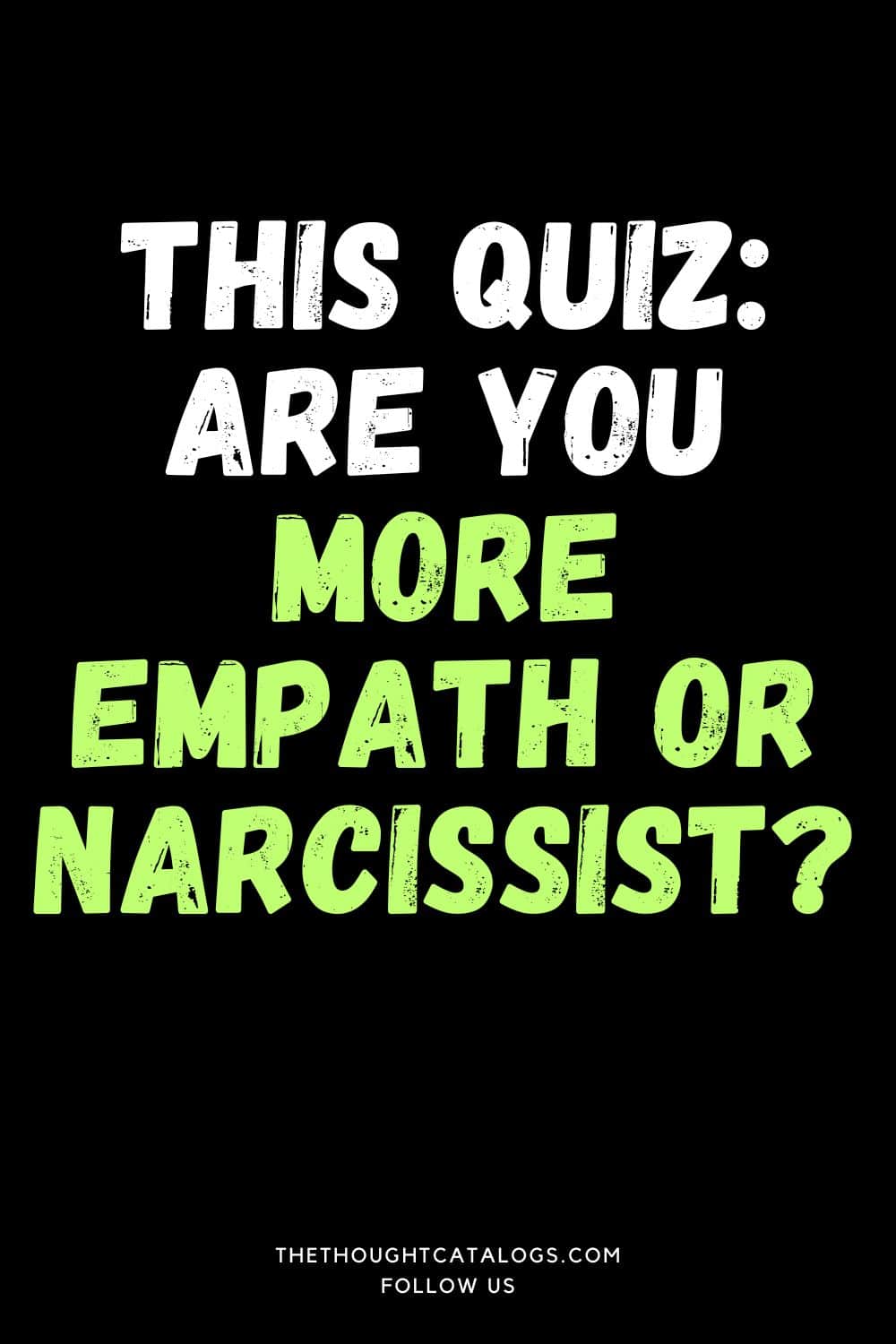This QUIZ: Are You More Empath Or Narcissist?

Are you curious about your personality traits? Do you wonder if you lean more toward empathy or narcissism? Understanding these aspects of your personality can provide valuable insights into how you interact with others and the world around you. In this article, we will explore the concepts of empathy and narcissism, and guide you through a quiz that will help you determine where you fall on the spectrum.
Introduction
Empathy and narcissism are two contrasting personality traits that shape our behaviors and attitudes. Empathy involves the ability to understand and share the feelings of others, while narcissism revolves around self-centeredness and an inflated sense of self-importance. By examining these traits within ourselves, we can gain a deeper understanding of our interpersonal dynamics and work towards personal growth.
What is empathy?
Empathy is the capacity to recognize and comprehend the emotions experienced by others. It allows us to step into someone else’s shoes and share in their joys, sorrows, and challenges. There are various forms of empathy, including cognitive empathy, which involves understanding another person’s perspective, emotional empathy, which involves experiencing the emotions of others, and compassionate empathy, which drives us to take action to alleviate someone’s suffering.
What is narcissism?
Narcissism, on the other hand, revolves around self-centeredness and an excessive preoccupation with one’s own needs and desires. It manifests as a grandiose sense of self-importance, a constant craving for admiration, and a lack of empathy for others. There are different types of narcissism, including grandiose narcissism, characterized by arrogance and a sense of entitlement, and vulnerable narcissism, characterized by fragile self-esteem and hypersensitivity to criticism.
Quiz: Assessing your empathy levels
Now, let’s dive into the quiz that will help you assess your empathy levels. Respond to the following questions honestly, and assign a score to each based on how well it represents your usual behavior or attitudes.
- Do you often find yourself genuinely sharing in other people’s happiness and celebrating their successes? (1 – Not at all, 5 – Absolutely)
- How often do you listen attentively to others without interrupting or immediately shifting the focus back to yourself? (1 – Rarely, 5 – Always)
- Are you able to recognize and understand the emotions someone else is experiencing even without them explicitly expressing it? (1 – Not usually, 5 – Almost always)
- Do you frequently engage in acts of kindness and support for others without expecting anything in return? (1 – Rarely, 5 – Very often).
Interpreting the quiz results
Once you have completed the quiz, it’s time to interpret the results. Add up your scores and refer to the following scale to determine your empathy levels:
- 15-25: Low empathy
- 26-35: Moderate empathy
- 36-45: High empathy
Keep in mind that this quiz provides a general assessment and should not be considered a definitive measure of your empathy levels. However, it can offer valuable insights into your empathetic tendencies and areas for potential growth.
Balancing empathy and narcissism
It is important to strike a balance between empathy and narcissism. While empathy allows us to connect with others on a deep level and foster meaningful relationships, narcissism can hinder our ability to truly understand and care for others. Cultivating empathy involves practicing active listening, developing self-awareness, and engaging in acts of kindness and compassion. At the same time, managing narcissistic tendencies requires introspection, humility, and a willingness to prioritize the well-being of others.
Benefits of empathy
Embracing empathy brings about numerous benefits in both personal and social contexts. By understanding and sharing the feelings of others, we can create stronger connections, build trust, and foster a sense of community. Empathy also enhances emotional intelligence, allowing us to navigate complex social situations with sensitivity and understanding. Moreover, a more empathetic society promotes compassion, acceptance, and support for one another, leading to a more harmonious and inclusive world.
Pitfalls of narcissism
On the other hand, excessive narcissism can have detrimental effects on our relationships and overall well-being. Narcissistic individuals often struggle to empathize with others and prioritize their own needs above all else. This self-centeredness can strain relationships, hinder effective communication, and lead to feelings of isolation and loneliness. Recognizing and addressing narcissistic tendencies is crucial for personal growth and maintaining healthy connections with others.
Developing empathy and reducing narcissism
If you find that your empathy levels could use improvement or that you exhibit narcissistic tendencies, there are strategies you can employ to foster empathy and reduce narcissism. Active listening, which involves fully engaging with others and seeking to understand their perspective, is a powerful tool for cultivating empathy. Additionally, developing self-awareness through practices like meditation or therapy can help uncover underlying reasons for narcissistic behaviors and aid in their management.
The importance of self-care
While empathy is a valuable trait, it’s important to remember the significance of self-care. Balancing empathy with self-preservation is essential to prevent emotional exhaustion and maintain overall well-being. Setting healthy boundaries, practicing self-compassion, and seeking support when needed are crucial elements of self-care. By taking care of ourselves, we can continue to show up empathetically for others without sacrificing our own mental and emotional health.
Case studies and real-life examples
To further illustrate the concepts of empathy and narcissism, let’s explore some case studies and real-life examples. These instances will showcase empathetic behaviors and their positive impact, as well as highlight narcissistic traits and their consequences. By examining these scenarios, we can deepen our understanding of empathy and narcissism in practical contexts and gain insights into their effects on individuals and relationships.
Conclusion
Understanding where you fall on the spectrum between empathy and narcissism is an important step toward personal growth and building meaningful connections with others. By developing empathy, we can enhance our relationships, foster compassion, and contribute to a more empathetic and understanding society. It’s a journey of self-discovery and continuous improvement that requires self-reflection, openness, and a willingness to learn from our experiences.
FAQs
Q: What are some common signs of empathy?
A: Common signs of empathy include actively listening to others, showing understanding and validation, expressing kindness and compassion, and being able to put yourself in someone else’s shoes.
Q: Can someone be both empathetic and narcissistic?
A: While individuals can exhibit both empathetic and narcissistic traits to some extent, these traits tend to exist on opposite ends of the spectrum. Striking a balance between them is crucial for healthy relationships and personal well-being.
Q: Can empathy and narcissism be genetic?
A: Research suggests that both empathy and narcissism have genetic components. However, environmental factors and personal experiences also play significant roles in their development.
Q: Are empathy and sympathy the same thing?
A: While empathy and sympathy are related, they are not the same. Empathy involves understanding and sharing the emotions of others, whereas sympathy involves feeling compassion or concern for someone’s hardships without necessarily experiencing their emotions.
Q: How can I improve my empathy skills?
A: Improving empathy skills involves actively practicing active listening, developing self-awareness, engaging in acts of kindness, and seeking to understand the perspectives and experiences of others. Therapy or counseling can also be beneficial for personal growth and enhancing empathy.




